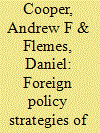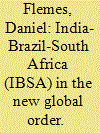|
|
|
Sort Order |
|
|
|
Items / Page
|
|
|
|
|
|
|
| Srl | Item |
| 1 |
ID:
123530


|
|
|
|
|
| Publication |
2013.
|
| Summary/Abstract |
This Introductory Review examines the major debates concerning the rise of emerging powers in the global system. It points to the fundamental difference between the contours of ascendancy in the first quarter of the twenty-first century from previous historical eras with reference to the number of countries placed in this category, the privileging of economic dimensions of power, and the much more elaborate and open levels with regard to institutionalization. Ample attention is paid to the BRICS, but consistent with the image of multipolarity, it also gives some emphasis to the question of whether the changing global system provides enhanced space for middle powers. After highlighting these highly relevant contextual considerations, the core of the Review moves to an analysis centred on more specific puzzles about the foreign policy strategies of emerging powers. One major puzzle is whether the preference of rising states is to work through established institutions or to utilize parallel and/or competitive mechanisms. Another concerns the balance between material interests, status-enhancement, and identity issues as motivators for policy preferences. Still another focuses on the degree to which China should be differentiated from the other BRICS, or indeed whether the BRICS share values such as a common politics of resentment or want to differentiate themselves on a normative-oriented basis in alterative groupings such as IBSA. A more sophisticated awareness of the limitations as well as of the capacities of the BRICS - with an appreciation of the intricate mix of concerns about solidarity and sovereignty, as well as conceptual tensions between realism and complex interdependence - is not only important for assessing the future trajectory of the BRICS role in the world, but in locating space for categories of countries such as middle powers. The major puzzle for middle powers is whether or not they will be able to mobilize attributes, notably the leveraging of 'network power', that provide them with comparative advantage. Although in overall terms the global system has not progressed towards multipolarity in a linear fashion underwritten by alternative actors, it is precisely due to this imprecision - and level of academic and operational contestation - that the articles assembled in this Special Issue have such salience.
|
|
|
|
|
|
|
|
|
|
|
|
|
|
|
|
| 2 |
ID:
103609


|
|
|
| 3 |
ID:
123534


|
|
|
|
|
| Publication |
2013.
|
| Summary/Abstract |
The multipolarity of the 21st century is fundamentally different from that of its harbingers because in the past decade change and innovation have been induced through sites of negotiation and by the establishment of intergovernmental foreign policy networks. New powers like Brazil, China and India have gained relative weight thanks to their status as agenda setters, brokers and coalition builders. This paper examines the relevance of different foreign policy networks such as India-Brazil-South Africa ( ibsa ) and Brazil-South Africa-India-China ( basic ) for their strategic approaches and argues that they are crucial vehicles for their ascension. Drawing on the work of Hafner-Burton et al, who raised the question of how states increase their power by enhancing their network positions, a typology of foreign policy networks is proposed: mediation, advocacy and substitution networks play important roles in today's shifting global order. The paper analyses how the different network types work together and how particular states have adapted better to the new environment than others.
|
|
|
|
|
|
|
|
|
|
|
|
|
|
|
|
| 4 |
ID:
131998


|
|
|
|
|
| Publication |
2014.
|
| Summary/Abstract |
Rising powers have attracted tremendous interest in international politics and theory. Yet the ways in which secondary powers strategically respond to regional changes in the distribution of power have been largely neglected. This article seeks to fill this gap by presenting a systematic comparative analysis of the different types and causes of contestation strategies undertaken by secondary powers. Empirically, it focuses on two contentious regional dyads in East and South Asia, exploring how structural, behavioral, and historical factors shape the way in which Japan and Pakistan respond, respectively, to China's and India's regional power politics. The article concludes that the explanatory power of these factors depends on the respective secondary power's particular context: in the case of Japan, China's increasingly assertive regional behavior combined with a nontransparent military buildup has invoked the most significant strategic shifts, while in the case of Pakistani contestation, an increasing threat perception in the late 1980s led to the return to a pre-1971 revisionist agenda, whereas the overt nuclearization in the late 1990s mitigated India's growing conventional superiority and enabled Islamabad to replace soft balancing with more direct means of hard balancing.
|
|
|
|
|
|
|
|
|
|
|
|
|
|
|
|
|
|
|
|
|